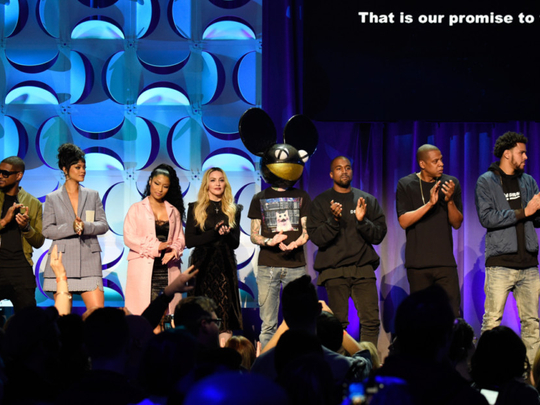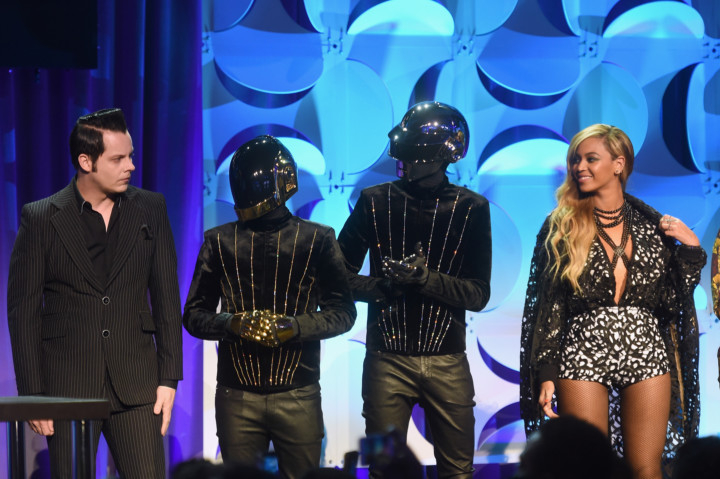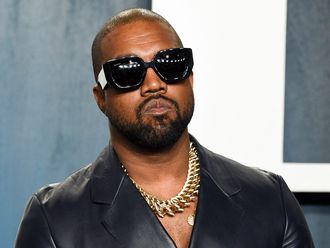
Rap mogul Jay Z on Monday launched the rebranded Tidal music streaming service with major star backing, hoping to shake up the growing industry through high sound quality and artist control.
With veiled swipes at streaming leader Spotify, Jay Z brought out musicians including Madonna, Kanye West and the masked electronic duo Daft Punk, who will all be equity partners in the new Tidal.
Jay Z earlier this year bought Tidal, which markets itself to audiophiles, by spending $56 million (Dh205.6 million) for its Swedish-listed parent company Aspiro.
The celebrities — who also included Jay Z’s wife Beyonce, rocker Jack White, Jason Aldean, Usher, members of Arcade Fire and deadmau5, rapper Nicki Minaj, Alicia Keys and R‘n’B singer Rihanna — stood in a line onstage as Keys spoke to the audience at Skylight at Moynihan Station in Manhattan. Most of them wore black as a sign of solidarity. Keys called the event “a graduation.”
“So we come together before you on this day, March 30th, 2015, with one voice in unity in the hopes that today will be another one of those moments in time, a moment that will forever change the course of music history. For today we announce of Tidal, the first ever artist-owned, global music and entertainment platform,” Keys said.
Keys hinted that some musicians could choose to release material exclusively or early on the artist-owned service.
“Tidal is dedicated to cultivating a sound business enterprise that promotes the health and sustainability of our art and our industry around the world,” Keys said.
“We believe it is in everyone’s interest — fans, artists and the industry as a whole — to preserve the value of music and to ensure a healthy and robust industry for years to come.”
The venue for the event was transformed to display a walkway paying tribute to the different decades in music, starting with the 1950s.
Coldplay’s Chris Martin and Calvin Harris, who both appeared via video, are also co-owners.
“Our mission goes beyond commerce, it goes beyond technology. Our intent is to preserve music’s importance in our lives,” Keys said. “Music is the language of love, of laughter, of heartbreak, of mystery. It’s the world’s true, true, without question, universal language.”
Tidal released a promotional video in which musicians accused unnamed streaming companies of treating them as mere commercial products.
“They are the carrier; we are the artists. Somehow things shifted and we went into the background, and it has to come forward,” Madonna said.
Focus on quality
Exact financial details were not disclosed and the glitzy line-up did not directly address how artists played on Tidal would be compensated. Tidal is offering a mix of stock and cash to its owners for promotional support, which does not include rights to the music, the Financial Times reported. One partner was offered $3 million for a 3 per cent stake, the report said.
Up for grabs are potentially billions of dollars in revenue that fans pay for music streaming every year. Artists have been critical that streaming services pay most of the royalties to record labels and music publishers, instead of the singers and musicians who created the music.
Singer Taylor Swift famously yanked her latest album 1989 from Spotify last fall because she didn’t want her songs offered on the service’s free version. She maintains that music should not be free because it sets a dangerous precedent that consumers don’t have to pay for listening to albums.
The artists signed a declaration to the sounds of Radiohead, the British experimental rockers who have also accused Spotify of devaluing music through meagre payouts to artists.
Spotify has rejected the accusations, saying that it is a rare source of growth in music sales and has paid out $2 billion toward artists since 2007.
Streaming — which allows users to play unlimited on-demand music online — has quickly shaken up the industry, narrowly edging out CD sales in revenues last year in the United States.
Spotify, also from Sweden, says it has 60 million users with 15 million of them paying — usually $9.99 a month.
Unlike Spotify, Tidal does not offer a free service and is generally twice as expensive, at $19.99 a month, although for the relaunch, it also offered a more basic $9.99 service.
Tidal streams at 1,411 kilobytes per second — well above the 320 for premium subscribers of Spotify, which offers even lower levels for free users.
The difference means that Tidal offers higher sound quality for audiophiles with advanced sound systems — but that casual listeners using simple laptops or smartphones may face slower connections. Tidal is available in 35 countries and subscribers can listen offline to as many songs as their device will hold. Tidal will also try to distinguish itself through ample videos.
Jay Z did not speak at the announcement but in an interview to industry journal Billboard billed Tidal as a new way for artists to experiment with form.
“It doesn’t have to be three minutes and 30 seconds. What if it’s a minute and 17, what if it’s 11 — you know, just break format,” Jay Z said.
He acknowledged that some music labels were nervous about the project but described it more as a “record store” than a new record company.













